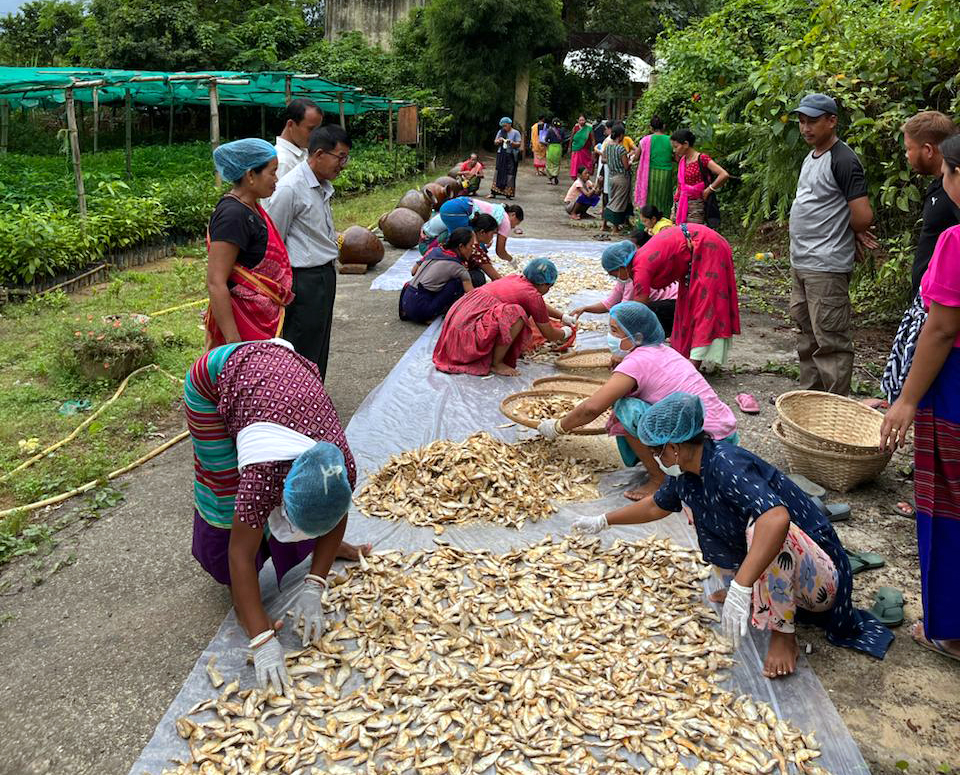The Tripura government, in collaboration with the Japan International Cooperation Agency (JICA), has launched a training program focused on hygienic fermented fish production. This initiative, part of the Sustainable Community-Based Agriculture and Fisheries Management Project (SCATFORM), aims to support Women’s Self-Help Groups (SHGs) in the state, equipping them with essential skills and knowledge for sustainable fish processing and entrepreneurship.
The SCATFORM Project: An Overview
The SCATFORM project is a vital initiative aimed at promoting sustainable agricultural practices and enhancing food security in Tripura. It emphasizes community participation and seeks to strengthen local economies by improving agricultural productivity and creating alternative livelihood opportunities. One of the project’s key components is empowering women, who play a crucial role in the state’s socio-economic landscape, particularly in rural areas.
Importance of Hygienic Fermented Fish Production
Fish is a staple food in Tripura, with local communities relying on fishing as a primary source of nutrition and income. However, traditional fish processing methods often lack hygiene and quality control, leading to health risks and reduced marketability. The introduction of hygienic fermented fish production techniques is expected to address these issues while enhancing the quality and safety of fish products.
Fermented fish products are not only popular in local cuisine but also have significant market potential. By training women to produce these items hygienically, the SCATFORM project aims to empower them economically and socially. This initiative will help women develop skills in processing, packaging, and marketing fermented fish, creating opportunities for income generation and improving their status within their communities.
Training Program Details
The training program comprises several sessions focusing on various aspects of fish fermentation, including:
- Hygiene Practices: Participants are taught the importance of cleanliness and sanitation in food processing. This includes proper handling of fish, maintaining cleanliness in the workspace, and adhering to safety standards to prevent contamination.
- Fermentation Techniques: The training covers traditional and modern fermentation methods, enabling participants to learn about the science behind fermentation and how to enhance the flavor and shelf life of fish products.
- Quality Control: Women are trained in quality assurance practices to ensure that their products meet market standards. This includes understanding the sensory attributes of fermented fish, such as taste, smell, and texture.
- Packaging and Marketing: The program also includes training on effective packaging techniques to preserve the quality of the products and marketing strategies to promote their goods in local and regional markets.
- Business Management: Participants are educated on basic business principles, including cost management, pricing strategies, and financial planning, enabling them to run their own fish processing enterprises effectively.
Impact on Women’s Empowerment
The training program has seen enthusiastic participation from women across various self-help groups in Tripura. By gaining practical skills in fermented fish production, these women are not only enhancing their livelihoods but also fostering a sense of independence and self-confidence.
Moreover, the initiative promotes community collaboration as women from different backgrounds come together to share knowledge, experiences, and resources. This collective effort strengthens social ties and fosters a supportive network that encourages further entrepreneurial activities.
Enhancing Food Security and Economic Development
The SCATFORM project aligns with broader goals of food security and economic development in Tripura. By promoting sustainable practices in fish production, the initiative contributes to the overall well-being of communities. Hygienic fermented fish production can lead to an increased supply of safe and nutritious food, directly impacting public health and nutrition.
Furthermore, as women become economically empowered through their participation in the fish processing industry, their increased income can significantly benefit their families and communities. Women tend to reinvest a significant portion of their earnings in their households, leading to improved education, health, and overall quality of life for their children.
Future Prospects
The success of the training program has garnered attention from various stakeholders, leading to potential expansion opportunities. The Tripura government plans to explore additional training modules and diversify the range of products produced by Women’s SHGs. Collaborations with local markets, cooperatives, and government agencies will be vital in ensuring sustained support for these initiatives.
Additionally, there is potential for integrating technology into the production process, such as using digital platforms for marketing and sales, which can further enhance the reach and profitability of the women’s enterprises.
The hygienic fermented fish production training under the Tripura JICA project (SCATFORM) represents a transformative initiative that empowers women, promotes sustainable practices, and enhances local economies. By equipping Women’s SHGs with essential skills and knowledge, the program not only improves their livelihoods but also contributes to broader goals of food security and community development. As this initiative progresses, it holds the promise of creating lasting change in the lives of women in Tripura and beyond.

